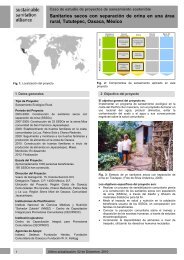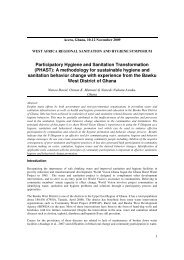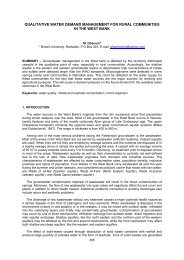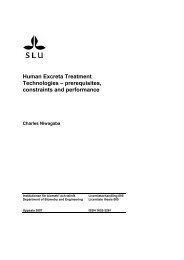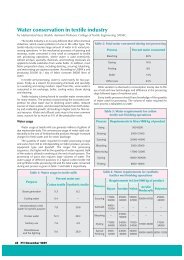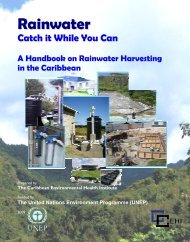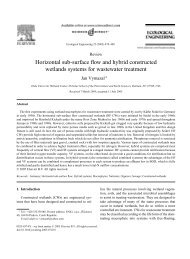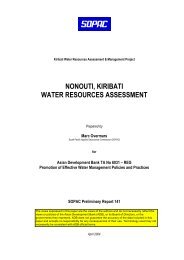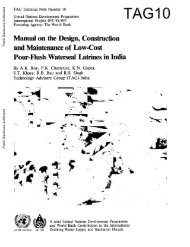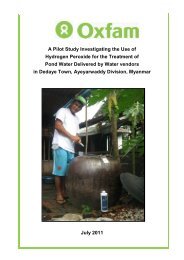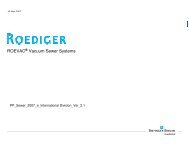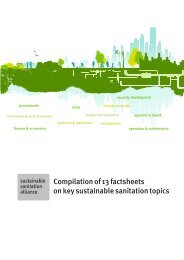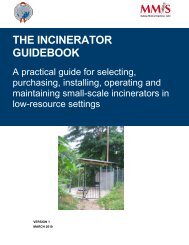Fertigation: Optimizing the Utilization of Water and Nutrients - SSWM
Fertigation: Optimizing the Utilization of Water and Nutrients - SSWM
Fertigation: Optimizing the Utilization of Water and Nutrients - SSWM
Create successful ePaper yourself
Turn your PDF publications into a flip-book with our unique Google optimized e-Paper software.
Role <strong>of</strong> Mineral <strong>Nutrients</strong> in Tolerance <strong>of</strong> Crop Plants to<br />
Environmental Stress Factors<br />
Ismail Cakmak<br />
Sabanci University, Faculty <strong>of</strong> Engineering <strong>and</strong> Natural Sciences, Istanbul,<br />
Turkey. E-‐mail: cakmak@sabanciuniv.edu.<br />
Abstract<br />
Around 60% <strong>of</strong> cultivated soils worldwide have plant-‐growth-‐limiting problems<br />
caused by mineral nutrient deficiencies <strong>and</strong> toxicities. Therefore, improving <strong>the</strong><br />
mineral nutritional status <strong>of</strong> plants under marginal environmental conditions is<br />
<strong>of</strong> great importance for maintenance <strong>of</strong> crop productivity. In most cases plants<br />
growing under marginal environmental conditions (e.g. salinity, low <strong>and</strong> high<br />
temperatures, <strong>and</strong> drought) receive much more sunlight than <strong>the</strong>y can utilize in<br />
photosyn<strong>the</strong>tic electron transport <strong>and</strong> CO2 fixation. This causes excessive<br />
accumulation <strong>of</strong> absorbed light energy <strong>and</strong> <strong>of</strong> photoreductants in <strong>the</strong><br />
chloroplasts, which leads to activation <strong>of</strong> molecular O2 to reactive oxygen<br />
species (ROS). When ROS are not adequately scavenged, photooxidative<br />
damage occurs in <strong>the</strong> chloroplasts, <strong>and</strong> leads to chlorophyll damage, lipid<br />
peroxidation <strong>and</strong>, consequently, cell death. By limiting <strong>the</strong> utilization <strong>of</strong><br />
absorbed light energy in photosyn<strong>the</strong>sis, environmental stress factors increase<br />
<strong>the</strong> potential for photooxidative damage in chloroplasts. Because an adequate<br />
supply <strong>of</strong> mineral nutrients is indispensable for maintenance <strong>of</strong> photosyn<strong>the</strong>tic<br />
electron transport <strong>and</strong> carbon metabolism, impairment <strong>of</strong> <strong>the</strong> mineral nutritional<br />
status <strong>of</strong> plants under marginal environmental conditions can exacerbate<br />
photooxidative damage <strong>and</strong> limit plant performance. In <strong>the</strong> present study,<br />
several examples are given, which show that plants exposed to environmental<br />
stresses require additional supplies <strong>of</strong> mineral nutrients, particularly nitrogen<br />
(N), potassium (K), magnesium (Mg), calcium (Ca) <strong>and</strong> zinc (Zn) to minimize<br />
<strong>the</strong> adverse affects <strong>of</strong> stresses. Enhanced production <strong>of</strong> ROS in plants under<br />
marginal conditions is not caused only by impairment <strong>of</strong> photosyn<strong>the</strong>tic electron<br />
transport. It appears likely that an NADPH-‐dependent oxidase is ano<strong>the</strong>r<br />
important source <strong>of</strong> ROS, which is stimulated by drought, chilling, <strong>and</strong>/or<br />
salinity. Of <strong>the</strong> mineral nutrients, K <strong>and</strong> Zn seem to interfere with <strong>the</strong> NADPH-‐<br />
oxidizing enzyme <strong>and</strong> thus to provide additional protection against damaging<br />
attack <strong>of</strong> ROS under salinity, drought <strong>and</strong> chilling stress. It is concluded that<br />
improving <strong>the</strong> mineral nutritional status <strong>of</strong> crop plants is <strong>of</strong> great importance for<br />
35



